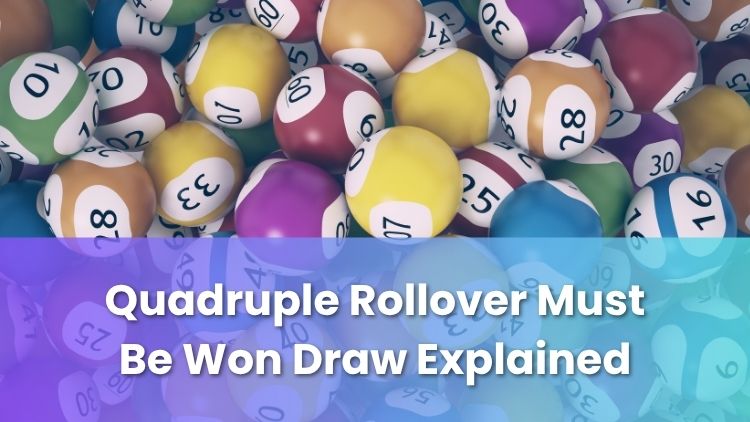
In some lotteries, rollovers occur when the jackpot isn’t won, allowing the top prize to grow larger with each draw. But what happens when this continues for several draws in a row? Does reaching a quadruple rollover mean the jackpot has to be paid out? And what exactly is a "Must Be Won" draw?
If you've ever found yourself asking these questions, you're not alone. Lottery rules can vary widely between games, and knowing how rollovers and prize limits work can help you understand what to expect if you choose to take part.
In this blog post, we’ll walk you through how quadruple rollovers work, when Must Be Won draws come into play, and how these rules could affect prize payouts. Keep reading to learn more.
Quadruple Rollover Meaning Explained
A quadruple rollover happens when no one wins the jackpot in four consecutive draws, which causes the top prize to increase each time it goes unclaimed. After the fourth rollover, the rules sometimes require a specific action, such as triggering a “Must Be Won” draw.
By the time a quadruple rollover occurs, the jackpot can be much larger than usual. However, it’s important to remember that this doesn’t change your chances of winning if you choose to play; it only affects the size of the prize. You still need to match the main numbers in the usual way to win the jackpot.
How Many Times Can The Lottery Rollover?
Each lottery has its own rules about how many times the jackpot can roll over before it must be paid out. You can usually find these details on the lottery’s official website or in their terms and conditions.
For example, in the UK, the Lotto allows the jackpot to roll over up to five times. If it’s still not won after that, a “Must Be Won” draw takes place. Other lotteries may have different limits, so it’s always a good idea to check the specific rules for the game you’re interested in.
Must Be Won Draws And Payouts
When the maximum number of allowed rollovers has been reached, a "Must Be Won" draw is held, which means the jackpot must be paid out. If a player matches all the main numbers, they receive the full jackpot prize. However, if no one wins the jackpot, it doesn’t roll over again.
Instead, the prize money is shared among players in the next highest winning tier. For example, if nobody matches all the main numbers but several tickets match five numbers plus the bonus ball, the jackpot is divided between those winners. This is known as a “roll down”.
In a "Must Be Won" draw, all the prize money is distributed during that round. This often means larger prizes for those who win in the lower tiers compared to a regular draw.
Quadruple Rollover Vs Roll Down Explained
As explained earlier, a quadruple rollover refers to the jackpot not being won for four consecutive draws, with the prize amount increasing each time as it rolls over. It simply describes how many times the jackpot has carried forward without a winner.
In contrast, a roll down is a specific event that happens during a "Must Be Won" draw when the jackpot can no longer roll over. If no one wins the jackpot at this point, the prize money is distributed to players in the next highest prize tier, such as those matching five numbers plus the bonus ball.
So, the key difference is that a quadruple rollover is about the jackpot accumulating over several draws, while a roll down is about how the jackpot is shared out when it must be paid out, even without a top prize winner.
How Quadruple Rollover Rules Affect Your Chances
If you’re thinking about playing during a quadruple rollover, it’s important to know that the rules around rollovers and "Must Be Won" draws don’t change your actual chances of matching the winning numbers. Your odds of winning the jackpot remain exactly the same, no matter how many times it has rolled over.
Where these rules do have an impact is what happens if the jackpot isn’t won after four (or sometimes five) consecutive rollovers. In a "Must Be Won" draw, if no one matches all the numbers, the jackpot is shared among players in the next highest prize tier. This can mean bigger prizes for those who match fewer numbers than usual.
Remember, these rules influence how prizes are paid out, not your likelihood of winning. If you do decide to take part, make sure to set a budget you’re comfortable with and understand how the draw works before buying a ticket.
Always keep responsible gambling practices in mind and never spend more than you are willing to lose.
**The information provided in this blog is intended for educational purposes and should not be construed as betting advice or a guarantee of success. Always gamble responsibly.
